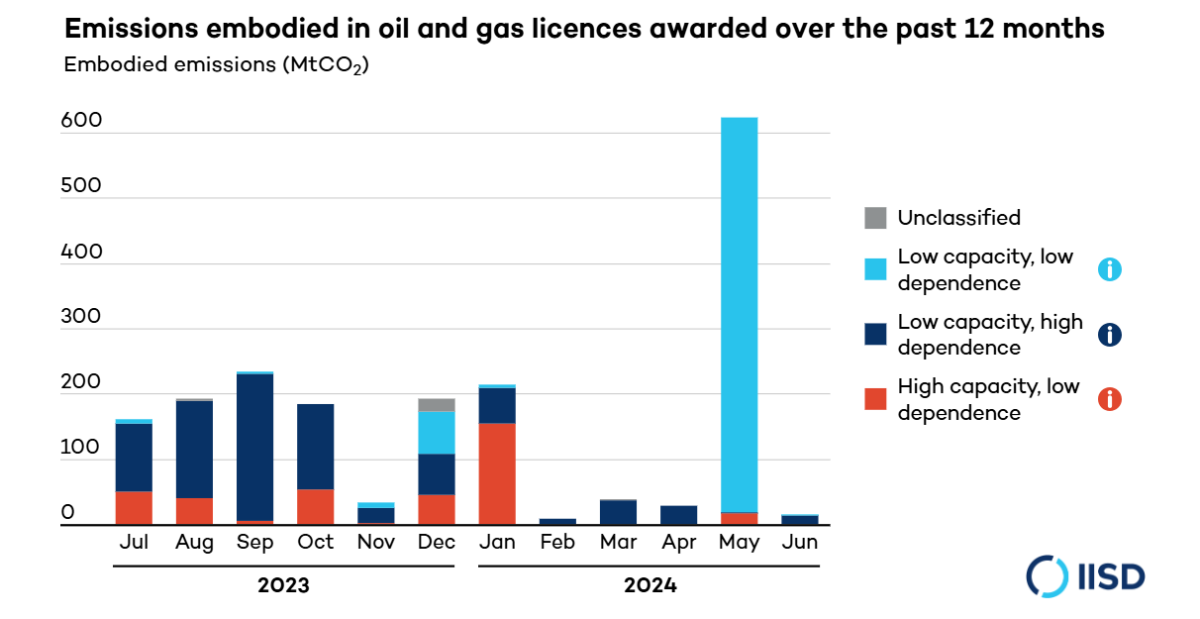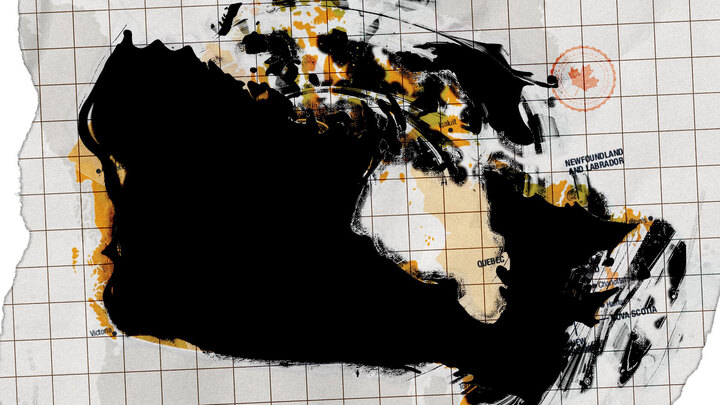Support strong Canadian climate journalism for 2025
Canada has been called out as a "climate hypocrite" by an independent international sustainability think-tank for claiming to be a clean energy transition leader while stepping up the award of oil and gas drilling permits to levels not seen since 2017.
Together with the United States, United Kingdom, Norway and Australia, Canada has this year granted oil and gas licenses that could release 12 billion tonnes of CO2 into the atmosphere if “fully exploited,” according to calculations by the International Institute for Sustainable Development (IISD) for a new report, Carbon Minefields.
This is equal to the combined greenhouse gas emissions from global hydrocarbon discoveries in the past four years, the report found, using data from Oslo-based industry analyst group, Rystad Energy.
A total of 18 new oil and gas licenses have been handed out this year in Canada alone, covering a total expected resource of 205 million barrels of oil and 850 billion cubic feet of gas – and representing embodied CO2 emissions of 137 million tonnes. Between 2014 and 2023, Canada was responsible for “more than a third” of the global carbon emissions embodied in license reserves awarded worldwide, said the IISD.
Canada, like the other industrial nations named in the report, is a “high capacity, low dependency” country, meaning it has large hydrocarbon reserves but also the “financial means, the technology, [and] the diversified economy that puts the onus on it to really lead the way in the transition,” Olivier Bois von Kursk, the lead author on the IISD report, told Canada’s National Observer.
“If these five developed nations – ‘other petrostates’ as some are calling them – don't accelerate their transitions and this hypocrisy continues, then it is very difficult to make the case to middle-and lower-income petrostate countries to not fully exploit the reserves they have,” he said.
This ramp-up in oil and gas exploration licensing also flies in the face of the International Energy Agency (IEA) declaration three years ago that there could be "no new investments in oil, gas and coal" if the world were to stand a chance of limiting the global temperature rise to 1.5°C above pre-industrial levels, as pledged in the 2015 Paris Agreement.
“No new licensing of oil and gas exploration would be a first step,” von Kursk said.
“If all licensed fields are fully exploited, the world will extract more than twice as much oil and gas in 2040 as is compatible with a 1.5°C global warming limit.”
The “production gap” is “not only widening but widening at the highest rate since 2015,” according to the IISD report.

No new oil or miss Paris goals
A paper by the IISD and the UK’s Imperial College published this year in Science, a scientific journal, concluded that based on global energy demand forecasts through to 2050 and U.N. climate change scenarios, “no new fossil fuel extraction or generation” was the only way to reach net-zero by mid-century.
Von Kursk believes the market that Canada's government and fossil fuel industry expect to exist by mid-century is at the same time “grossly overestimated.”
The Canada Energy Regulator forecasts the international appetite for Canadian oil and gas by mid-century will be a daily one million barrels of oil and 11 billion cubic feet of natural gas, down from 5.5 million barrels and 17 billion cubic feet today.
By contrast, the Energy Transitions Commission, a Europe-based think tank, predicts a worldwide market closer to one million barrels of Canadian crude oil and under six billion cubic feet of gas by 2050.
If Canadian oil and gas production were 1.5°C-aligned, based on the IEA’s net-zero scenarios, “no new reserves would be developed and, at a minimum, production would follow the natural decline rates of the fields already in production or under development,” the IISD said.
If no new oil and gas fields were developed, Canadian production would have peaked at about 60 billion barrels of oil and gas in 2023, before decreasing by about 20 per cent by 2030 and 70 per cent by 2025, according to IISD research.
The IEA said in June it expected global oil demand to peak by 2030 “as the pandemic rebound loses steam, clean energy transitions advance, and the structure of China’s economy shifts.”
“There is a lot of stranded asset risk if Canada continues to invest in new oil and gas fields,” von Kursk said, adding Canada should be the fastest in phasing-out oil and gas production because its economy is less dependent on energy revenues.

“When you are in a hole you need to stop digging,” he said.
Is Canadian climate action “on track”?
The federal government, responding to the findings of the IISD report, defended Canada’s climate change commitments and energy policies, but did not directly address the uptick in the number of oil and gas licenses granted in 2024.
“We are the first major producer in the world to introduce a cap on emissions from the oil and gas sector, which will hold the industry accountable to their own emissions reduction commitments while enhancing competitiveness, and respecting provincial jurisdiction over energy production,” a spokesperson from the Ministry of Energy and Natural Resources said in a statement to Canada’s National Observer.
The ministry pointed to tighter methane regulations and green technology and clean economy tax credits as examples of its efforts to further reduce CO2 emissions from the energy sector.
“Canada is fully committed to our climate goals. We are on track to meet our 2026 interim climate goal, and we will achieve our 2030 target on the road to net-zero by 2050,” the ministry spokesperson said.
However, Canada's auditor general said last November the 2030 target to cut greenhouse gas emissions by 40-45 per cent below 2005 levels to meet the country’s Paris Agreement pledge was wishful thinking.
“Here you can see the hypocrisy,” von Kursk said of Canada’s practice of measuring greenhouse gas emissions within its borders but not accounting for the emissions from oil and gas exports burned outside the country.
“Putting a halt to new license awards is absolutely imperative if Canada is going to regain credibility as a climate leader,” he said. “Right now, Canada really is one of the biggest climate action laggards, whatever and however it messages.”






Comments
I'm surprised Russia is not on this list.